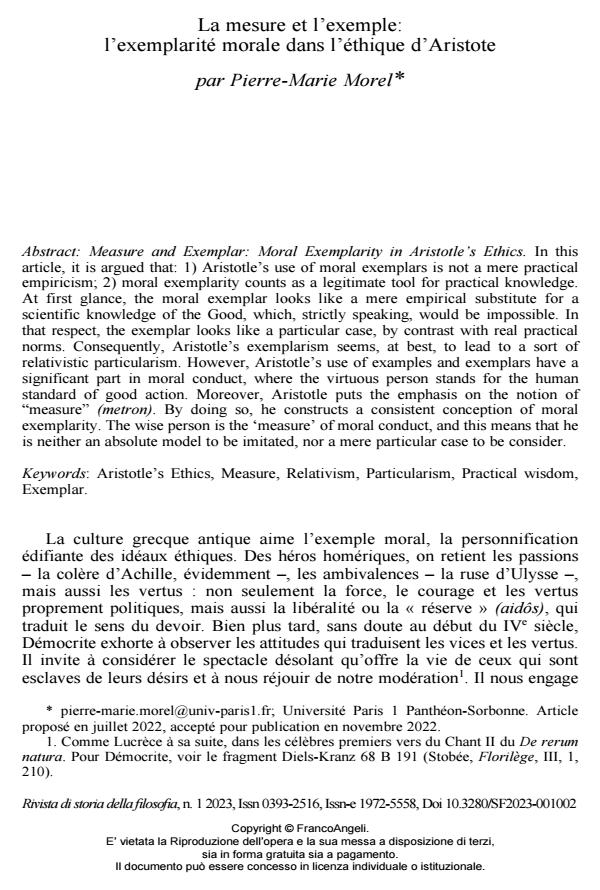La mesure et l’exemple: l’exemplarité morale dans l’éthique d’Aristote
Titolo Rivista RIVISTA DI STORIA DELLA FILOSOFIA
Autori/Curatori Pierre-Marie Morel
Anno di pubblicazione 2023 Fascicolo 2023/1
Lingua Francese Numero pagine 14 P. 11-24 Dimensione file 139 KB
DOI 10.3280/SF2023-001002
Il DOI è il codice a barre della proprietà intellettuale: per saperne di più
clicca qui
Qui sotto puoi vedere in anteprima la prima pagina di questo articolo.
Se questo articolo ti interessa, lo puoi acquistare (e scaricare in formato pdf) seguendo le facili indicazioni per acquistare il download credit. Acquista Download Credits per scaricare questo Articolo in formato PDF

FrancoAngeli è membro della Publishers International Linking Association, Inc (PILA), associazione indipendente e non profit per facilitare (attraverso i servizi tecnologici implementati da CrossRef.org) l’accesso degli studiosi ai contenuti digitali nelle pubblicazioni professionali e scientifiche.
In this article, it is argued that: 1) Aristotle’s use of moral exemplars is not a mere practical empiricism;; 2) moral exemplarity counts as a legitimate tool for practical knowledge. At first glance, the moral exemplar looks like a mere empirical substitute for a scientific knowledge of the Good, which, strictly speaking, would be impossible. In that respect, the exemplar looks like a particular case, by contrast with real practical norms. Consequently, Aristotle’s exemplarism seems, at best, to lead to a sort of relativistic particularism. However, Aristotle’s use of examples and exemplars have a significant part in moral conduct, where the virtuous person stands for the human standard of good action. Moreover, Aristotle puts the emphasis on the notion of "measure" (metron). By doing so, he constructs a consistent conception of moral exemplarity. The wise person is the ‘measure’ of moral conduct, and this means that he is neither an absolute model to be imitated, nor a mere particular case to be consider.
Parole chiave:Aristotle’s Ethics, Measure, Relativism, Particularism, Practical wisdom, Exemplar.
- Introduction: Is Environmental Virtue Ethics a ‘Virtuous’ Anthropocentrism? Sylvie Pouteau, Gérald Hess, in Philosophies /2024 pp.172
DOI: 10.3390/philosophies9060172 - Exemplary Virtue: The Function of Exempla in Moral Instruction in the Middle Ages Ana Rieger Schmidt, in Topoi /2025 pp.971
DOI: 10.1007/s11245-025-10199-z
Pierre-Marie Morel, La mesure et l’exemple: l’exemplarité morale dans l’éthique d’Aristote in "RIVISTA DI STORIA DELLA FILOSOFIA" 1/2023, pp 11-24, DOI: 10.3280/SF2023-001002